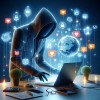Understanding Webcam Hacking
Webcam hacking is a growing concern in the digital world. With advancements in technology, hackers have found ways to exploit vulnerabilities in webcams, gaining unauthorized access to private spaces. But how real is this threat, and should you be worried? Let’s dive in.
The Evolution of Webcam Technology
Webcams have evolved from simple video recording devices to highly integrated tools for communication and security. They’re now embedded in most laptops, smartphones, and even household devices. However, as their utility has grown, so have the risks associated with their misuse.
Common Methods Hackers Use
Hackers employ various techniques to breach webcams. Phishing emails, malware, and Trojan horse programs are popular methods. They often trick users into clicking on malicious links or downloading infected files, granting hackers access to the device’s camera.
Signs Your Webcam Might Be Compromised
How can you tell if your webcam has been hacked? Look out for unusual behavior like the camera light turning on by itself, increased system activity, or strange files on your computer. These can be warning signs that someone is spying on you.
Real-Life Cases of Webcam Hacking
Numerous cases of webcam hacking have been reported worldwide. In some instances, hackers have used compromised webcams for extortion, while others have engaged in illegal surveillance. These real-life stories underline the seriousness of the issue.
The Role of Stalking in Webcam Hacking
Webcam hacking and stalking often go hand-in-hand. Cyberstalkers use hacked webcams to observe victims’ activities, invading their privacy and creating a sense of fear. This form of stalking can have devastating psychological effects.
Is It Really a Widespread Issue?
While the thought of webcam hacking is alarming, it’s essential to understand the scale of the problem. Not everyone is at risk, but individuals who are less cautious with their online habits may be more vulnerable.
Busting Myths Around Webcam Hacking
Many myths surround webcam hacking, such as the belief that all hackers can instantly access any webcam. The reality is that hacking requires skill, opportunity, and often user error. Taking precautions significantly reduces the risk.
How Hackers Monetize Webcam Hacks
Hackers exploit compromised webcams in various ways, from selling footage on the dark web to using it for blackmail. The financial incentives behind these activities drive many cybercriminals to target webcams.
How to Protect Your Webcam
Protecting your webcam starts with securing your devices. Use strong, unique passwords, update your software regularly, and avoid clicking on suspicious links. A physical cover for your camera adds an extra layer of security.
The Importance of Antivirus Software
Installing reputable antivirus software can help detect and block potential threats. Many antivirus programs offer real-time protection, scanning your device for malware and vulnerabilities that hackers exploit.
Securing Your Network
A secure network is crucial in preventing unauthorized access to your devices. Use encrypted Wi-Fi, change default router settings, and ensure your network is password-protected to reduce risks.
The Role of Two-Factor Authentication
Two-factor authentication adds an extra layer of security to your accounts. Even if a hacker manages to obtain your password, they’ll face another hurdle before gaining access to your data.
Legal Implications of Webcam Hacking
Webcam hacking is illegal and punishable by law. Authorities around the world are cracking down on cybercriminals, but individuals must also take steps to safeguard their privacy.
Conclusion
Webcam hacking and stalking are not just myths—they are genuine threats in today’s digital landscape. While the likelihood of being targeted may vary, the risks are real, and the consequences can be severe. Staying informed and proactive is key to protecting your privacy and security.
FAQs
1. Can covering my webcam really prevent hacking?
Yes, a physical cover effectively blocks access to your camera, even if a hacker gains control of your device.
2. What should I do if I suspect my webcam is hacked?
Disconnect your device from the internet, run a malware scan, and seek professional assistance to secure your system.
3. Are all webcams equally vulnerable to hacking?
Some webcams have better security features than others. Devices with outdated software or no encryption are more vulnerable.
4. Can hackers access microphones along with webcams?
Yes, if a hacker gains control of your webcam, they can often access your microphone as well, further invading your privacy.
5. Is webcam hacking preventable?
While no system is entirely foolproof, taking precautions like using strong passwords, updating software, and covering your webcam significantly reduces the risk.
Read more blogs: Alitech Blog


















